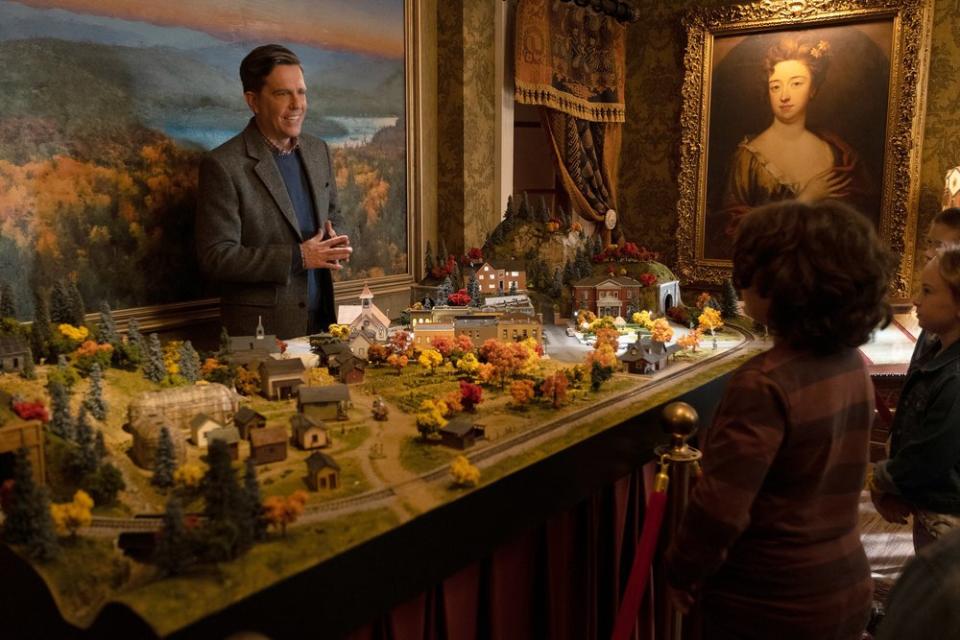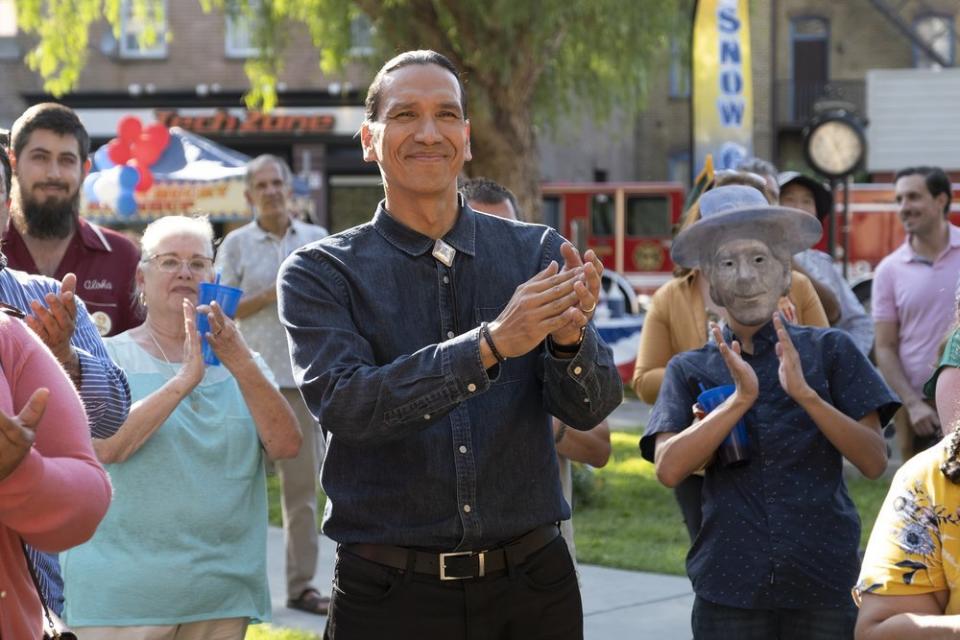A groundbreaking sitcom finds the ideal target: white people's love of a made-up past

- Oops!Something went wrong.Please try again later.
- Oops!Something went wrong.Please try again later.
In the deft new Peacock comedy "Rutherford Falls," which begins streaming Thursday, Ed Helms plays Nathan Rutherford, whose colonial ancestor Lawrence Rutherford gave his name to the town he founded. A statue locally known as Big Larry commemorates him, but because the charter insists that it occupy "the exact location" where the town was founded, it stands in the middle of the street. Out-of-town motorists have a tendency to crash into it. When the mayor (Dana L. Wilson) makes plans to move it, Nathan, whose house is a museum dedicated to his family history and who is averse to change, even measured in millimeters, starts to go to pieces.
Rutherford Falls borders the reservation of the (invented) Minishonka people, who were there first. Nathan's best friend since childhood is Reagan Wells (Jana Schmieding), a Minishonka woman who tends a sort of museum of her own, an ill-stocked cultural center attached to the nation's Running Thunder casino. Gamblers mistake it for a gift shop or "only come in to charge their phones." Like Nathan, Reagan — who doesn't live on the reservation but in town — is more in touch with the history of her people than with the actual people. It will not take even a moderately woke viewer to understand that this will lead to some kind of reckoning. As Nathan himself does not.
"If it can just be picked up and tossed around willy-nilly with no regard for its historical specificity," he wails, "then really who am I?"
"What you're describing is literally my entire life," says Reagan.
The series was created by Helms ("The Office," "The Hangover"), Mike Schur and Native American TV writer Sierra Teller Ornelas ("Brooklyn Nine-Nine," "Superstore") and like Schur's "Parks and Recreation" and "The Good Place," "Rutherford Falls" is rooted in situation and romantic comedy while asking questions like "How should we live?" and "What do we owe one another?" ("The Good Place," in which Hell is remodeled into something more humane, is as much a story of good government as "Parks and Recreation.") Schur's shows are sharp but thoughtful, old-fashioned at heart yet made original by their idiosyncrasies and ambitions. They can get dark, but the sun always comes up again. They are also reliably funny.
Only four out of the season's 10 episodes were made available for review, but "Rutherford Falls" is shaping up as a tale of society thrown into motion after a long period of self-satisfied stasis — a story of today, from Black Lives Matter to #MeToo. The removal of Confederate statues is explicitly referred to a couple of times, though in a way to suggest that Rutherford Falls' statue is quite another bronze kettle of fish. Apart from its inconvenient placement, the statue is not controversial; only Nathan cares much about it. Which is not to say it might not become so.

Nathan — whom we are carefully shown to be a good person — believes that history is a settled thing, more to be celebrated than examined. He lives through memories, both his and what he imagines to be the collective memory of the Rutherfords. Apart from his friendship with Reagan and the excitable presence of "museum director slash intern" Bobbie Yang (Jesse Leigh), he is, at first, the model of an affable eccentric. (The mayor calls him the "town's mascot.") Though in the opening scene a local schoolteacher energetically flirts with him ("You really got to ask Ms. Fish out before she dies trying to drop a hint," Reagan says), he does not seem intended for a romantic storyline. And as "the last Rutherford to live here in Rutherford Falls," a badge he wears proudly, he is something of a tribe of one.
In a way, Nathan is a more sympathetic version of the sort of person who romanticizes the antebellum South — not evil exactly, but someone who has had the luxury to remain clueless, cocooned. His blind love of All Things Rutherford, to the exclusion of almost everything else, allows him to say without irony, "Four hundred years ago brave settlers landed in a new world [and] befriended their Native American counterparts, all in the service of founding the very town in which you're standing right now." He also remarks that the deal Rutherford made with the Minishonka was "uniquely fair and honest." When a racist history professor with a podcast (Paul F. Tompkins) points out approvingly to Nathan that among the Rutherfords' list of historic firsts is "the first white baby born in Cobb's County," he is properly horrified: "It's not a point of pride!"
With six episodes yet to see, it's difficult to predict how adversarial and out-of-control things may get by season's end, but one can say with fair certainty that matters will spill beyond the confines of whatever section of New York state this town is set in. (Just down the road in the big city are the headquarters of Rutherford Inc., which makes "everything from missile guidance systems to wet wipes." Nathan has no power there, though he likes to think he does.) As it stands, there is less tension between the people of Rutherford Falls and of the Minishonka reservation, the Indigenous and non-Indigenous populations, than existed between Pawnee and Eagleton, Ind., in "Parks and Recreation" — and no jokes as acid as the incredibly racist murals that adorned the walls of Pawnee City Hall.
Although Nathan is the catalyst — he's an "Ed Helms type" you might say, normal with a chance of weird — it's Reagan who's really at the center of the story; although we are told that "everyone on the rez" hates her because of something she did in the far past, she maintains close or growing relationships with each of the other major characters, with room to grow. Schmieding was hired as a writer before she was cast to co-star and continues to write; she's one of five Indigenous writers on the show, including showrunner Ornelas. Though she studied theater in college and spent many years at New York's improvisational Magnet Theater, she is all but a newcomer to the screen. And she's very good, whether counterbalancing Helms, sparring with tribal leader and casino boss Terry Thomas (Michael Greyeyes) or flirting with Dustin Milligan ("Schitt's Creek") as Josh Carter, a naive but eager public radio journalist who senses "a story about stories…. It's about a town, but it's also about everything."

A self-described "shark" for whom power is a "zero-sum game," Terry is the series' antagonist — but he also seems to have the makings of a complicated hero. He takes Reagan under his wing even as he crushes her dreams of a more splendid cultural center. He's an upper-middle-class family man who asks his wife, "I'm cool, right?" and has a son who plays lacrosse and a daughter whose beadwork, Terry keeps telling her, could bring in "real money." "Teach a man to weave, you feed him for a day," he begins, "but a teach man the fundamentals of supply-side economics..." But she'd rather give it away.
As satire, "Rutherford Falls" is gentle rather than lacerating — even demons may be good people in Schur's comic cosmology, may even be Ted Danson — and the story more personal than political. Passing references to opioids and women's shelters notwithstanding, Rutherford Falls is a TV town, superimposed on the collective memory that is the Universal Studios backlot. By not turning people into talking points, Ornelas, Schur and Helms leave their characters free to become who they are in complicated ways, rather than what they are in obvious ones — to stand for themselves. Which is a political point, after all.
This story originally appeared in Los Angeles Times.

